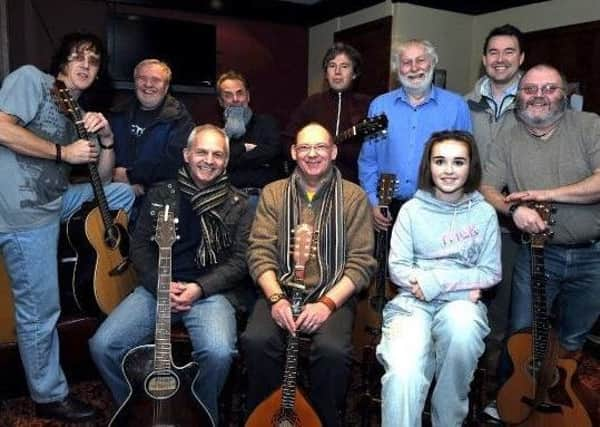Lanarkshire Songwriters album celebrates Clyde Valley


Now this world-famous and scenic area, known as Scotland’s Fruit Bowl, is offering something to please the ears too – a music album based on that produce.
And, no, it wasn’t made by Apple Records after a jam session but by a highly talented group of local musicians, backed by a label based in New Lanark.
Advertisement
Hide AdAdvertisement
Hide AdThe CD, called, aptly enough, Fruits of Their Labours, has been recorded by Lanarkshire Songwriters with the help of the Clyde and Avon Valley Landscape Partnersip (CAVLP).


Now the collaborators are offering 50 free copies of the CD to Gazette readers.
Explained a spokeswoman for CAVLP: “The album was part of a wider project which included oral histories from families of former fruit growers and horticulturalists.”
This created the earlier Apple Day album, with the help of local primary schools.
Advertisement
Hide AdAdvertisement
Hide AdThe follow-up Fruits of their Labours has, like the earlier one, received the financial backing of several bodies, including the LEADER rural economy fund and South Lanarkshire Council.


Bob Bradford, a member of Lanarkshire Songwriters, based his contribution on Jeelie Jars.
He said: “As soon as I settled in my own wee bit of the valley, I promised myself some old Clyde Valley apple and plum varieties in my garden as a connection with the past.
“Strawberries, rasps, currants and even rhubarb all find their way into my stack of jeelie jars.
Advertisement
Hide AdAdvertisement
Hide Ad“My jam always tends to be labour saving – it runs to the sides of the bread rather than needing spread ... maybe one day I’ll get it to set!”
The songs on the album were inspired by oral histories collected by Lanarkshire Songwriters with local folk sharing almost forgotten memories from the valley’s past.
In their research, they spoke to local sons and daughters of former fruit growers who shared their fond memories, some revealing that, no matter the circumstances, valley produce came first.
Mura Davidson, a local tomato grower, recalled: “I can remember the day I got married. My dad said: ‘There’s four tomato houses needing watered Mura. Go and get them done!’
Advertisement
Hide AdAdvertisement
Hide Ad“So, there’s me out watering the tomatoes with him saying: ‘You’re not getting married until 2pm – you’ve got plenty of time!’”
Lanarkshire Songwriter member Billy Stewart is the son and grandson of a fruit grower and nurseryman.
He led the Fruits of their Labours project.
“Growing up, I worked during the school holidays,” he said. “I seemed to get the jobs nobody else wanted.
“I never had the love of the land to make a career of it but, looking back, it was a major part of my life.
Advertisement
Hide AdAdvertisement
Hide Ad“That was what prompted me to establish the Fruits of their Labours project and this amazing album was born.”
Lorna Diplacito, CAVLP, finance and administration officer, said: “After listening to the songs and oral histories, as a local girl I felt really nostalgic as I recognised a lot of the local places mentioned, especially the Palais in Lanark where my parents would go dancing at weekends.
“I picked up a copy of the CD to listen to in my car and would highly recommend it to anyone with local connections.”
CAVLP is so keen to spread the message of what a fine piece of work the album is, using purely local talent and local tales, that it is offering 50 free copies of the CD edition of it on a first-come-first served basis.
Advertisement
Hide AdAdvertisement
Hide AdTo claim a copy, contact CAVLP on 01555 663430 or email your address to [email protected].
Further copies will be available at the Clyde and Avon Valley Exhibition from Saturday, February 17, to Sunday, March 18, at Chatelherault Country Park at Ferniegair.
Or listen to the oral histories and songs on the Clyde and Avon Valley virtual museum, by clicking ‘Art, Literature & Song’ at www.clydeandavonvalley.org/museum and Lanarkshire Songwriters website, www.lanarkshiresongwriters.co.uk/.
Thankfully, there has been a revival in the Clyde Valley’s orchards and a growing pride in all its produce. And thanks to projects like Fruits of their Labours, its glorious history will never be forgotten.
Valley rediscovering its roots
Advertisement
Hide AdAdvertisement
Hide AdAfter decades of decline in its importance to the Scottish horticulture and agricultural economies, in recent years the Clyde Valley has steadily – if you’ll excuse the pun – rediscovered its roots.
Since the last war, the valley was a place of seemingly endless new housing developments; to a local 60-year-old, Crossford appears to be double the size it was in their childhood.
Tourism also appeared to be playing an increasingly important part in the area’s economy with the creation of garden centres and other visitor-related ventures. However, some were worried that the orchards of the valley were steadily disappearing under this endless development. So the Orchard Group was set up to reverse this.
A spokesman explained: “The Clyde Valley orchards are an important part of our local landscape.
Advertisement
Hide AdAdvertisement
Hide Ad“They have seen the development of new varieties of fruit, been the source of new foods, drinks, songs and stories and provided an income for many small and large local businesses.
“They changed dramatically from their early monastic beginnings to become Scotland’s leading commercial fruit producing area in the 19th century.
“Since then, the markets for local fruit have slowly declined and today the orchards are in danger of being lost from our countryside.
“As orchards become a less common component of the landscape, and many stand neglected or under-utilised, more questions are being asked about what we are losing.
“These orchards provide an important bank of fruit and knowledge at a time when local produce and variety is starting to be valued in new contexts.”